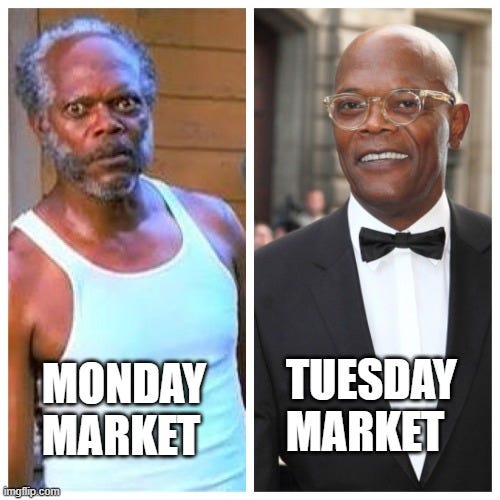You roll in late to work late Monday morning after another wonderful summer weekend (maybe your insides are still recovering from the Bourbon Trail) and you read this headline:
“The Dow Jones Industrial Average declined more than 700 points on Monday—its worst session since October—as anxiety mounted over the spread of the Delta coronavirus variant and its potential impact on the global economy.”
Holy shit, that sounds bad. The last time the Delts were this terrifying they were serving you jungle juice at their dimly-lit frat party. Probably feels like you should sell some stocks, but let’s wait to see what happens Tuesday:
“U.S. stock prices rose sharply, with the S&P 500 recording its best day in nearly four months, as investors rushed in to buy shares that had been knocked down in Monday’s steep selloff.”
Whew! We did it, guys. Time to buy a commemorative T-shirt.
The stock market recovered everything it lost on Monday and then some, nearing all-time highs by Wednesday. Lurking beneath the headlines, however, appears to be some lingering uncertainty: the Delta variant, the threat of sustained inflation, or softening economic data remain on the market’s mind. Why is “the market” so bipolar?
“The market” isn’t a single entity: it's a motley collection of day-traders, speculators, institutional investors, retail investors, algos, and YOLO Redditors, and they all have different views that are often predicated on underlying market conditions.
If things are clear, then everyone knows how they intend to make money. When conditions are unclear (or worse, clear to some but not others), that’s when you get days like Monday (or the last week).
Does that mean we’re at the start of another recession? Hardly. Down days happen: over the last twenty years, the S&P 500 Index suffered a daily loss of -1% or more 13% percent of the time or 709 times out of 5,324 trading sessions.
Lest we forget: the financial media exists to drive clicks. They are not fiduciaries. A headline like “Market drops slightly from all-time highs, in a statistically expected fashion” doesn’t sell ads.
Historically, the market trades between -0.9% and +1.0%. 40% of the time it’s up.
You may be eyeballing that chart to figure out if stocks are positive more than negative. While there are speed bumps, over the last twenty years stocks were up 55% of the time based on daily returns and produced around a 7% annual rate of return.
That is despite two recessions and a 100-year global pandemic. Essentially, that means you get to flip a weighted coin that comes up in your favor more often than not - if you stay invested.
We recommend something called dollar-cost averaging (‘DCA’). DCA is an investment strategy where you make consistent purchases into the market at regular intervals, regardless of the market’s price.
Sometimes you will buy-in at the lows, sometimes you will buy-in at the highs, and oftentimes you’ll buy in somewhere in the middle. But, over a long investment horizon (10 years or more), DCA makes sure your retirement account participates in the general direction of the market.
The other approach is something called buy the dip (‘BTD’), which calls for waiting for market sell-offs like Monday to deploy a lump sum on the expectation the market will quickly recover.
That may sound logical, but we would caution you before pursuing a BTD approach in your retirement accounts. Here’s why:
BTD is more appropriate if you’re trading individual stocks, in our view. If you are, then you likely have some conviction in the specific company, and a sell-off represents an opportunity to buy your preferred company at a discount.
It was impossible to anticipate Monday’s sell-off. When these sell-offs happen, you need to have cash on hand to buy in at a moment’s notice. Which means you’re monitoring your retirement account constantly. That’s no way to live and can actually lead to worse returns over-time.
BTD underperforms DCA over time. Where the the BTD strategy accumulates cash to then lump-sum buy when the price falls, DCA keeps you invested long-term. Nick Maggiuli authored a great piece that takes a deep dive into this specific subject. Here’s the big takeaway:
(The red dots indicate when to buy into the market)
What’s the Upside?
If you’re contributing to your retirement account then you’re already executing DCA to perfection. So, keep doing what you’re doing. If anything, double-check your investments to make sure you’re diversified and have something that can ensure participating in the general trend of the US stock market.
For Your Weekend:
This is where we’ll post a round-up of essays, podcasts, and streaming shows to check out over your weekend. We cast a wide net so you don’t have to.
Read:
The Fire That Forged Giannis Antetokounmpo by Mirin Fader (The Ringer)
In an exclusive excerpt from ‘Giannis: The Improbable Rise of an NBA MVP,’ Mirin Fader details the trials and tribulations that helped the Bucks star go from a baby-faced rookie to a superstar with a mean streak—and that scowl.
Bourbon and Bones by Jack (Weekly Upside)
Did you know you can invest in a bourbon barrel? Bourbon falls into a category of investments called real assets. And real assets just may be the key to weathering the next economic cycle.
Where Did That Cockatoo Come From? by Rebecca Mead (The New Yorker)
Birds native to Australasia are being found in Renaissance paintings—and in medieval manuscripts. Their presence exposes the depth of ancient trade routes.
Listen:
lately i feel EVERYTHING by WILLOW
Review from Pitchfork:
Willow’s pivot to snot-nosed power chords and down-tuned riffs might raise eyebrows after a three-album run of smooth R&B twinged with folksy mysticism. But her fascination with the harsher sounds of rock feels like a natural progression, one that marries her family’s musical history with her self-professed love for the genre. Willow grew up watching her mother, Jada Pinkett Smith, perform as a rare nu-metal frontwoman with her band Wicked Wisdom. She easily rattles off her musical inspirations—My Chemical Romance, Paramore, Fefe Dobson—and, perhaps because of her mother’s musical past, feels comfortable with the finer points of hard rock subgenres: She covered Wicked Wisdom for the Red Table for this past Mother’s Day, but in interviews, she’s careful to distinguish that sound from the more “youthful” bent of Zumiez rock.












